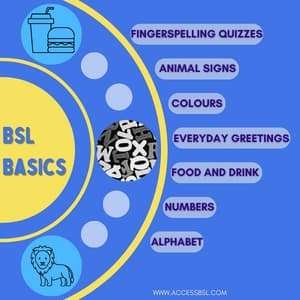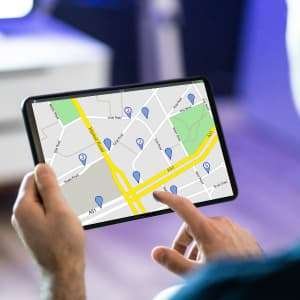A video summary of this post.
An audio summary of this post.
A BSL Basics course is an introductory course for those who are new to British Sign Language and is a great way to start your BSL journey! Course providers tend to teach a range of introductory signs to give you a solid foundation in BSL.
These days, you can choose to learn online with or without tutor support. Or, if you prefer face-to-face structured teaching, you can attend classroom sessions. Check out the information below for the different ways to start learning British Sign Language.
Basic BSL course content usually includes the topics list below. The links provide learning and revision resources to help you with your BSL skills:

- Alphabet
- Fingerspelling quizzes
- Deaf Awareness
- Everyday greetings
- Basic conversation phrases & questions
- Family and friends signs
- Rooms at home
- Weather
- Numbers (in different contexts)
- People signs (and how to describe them)
- Colours
- Animal signs
- Travel
- Food and Drink
- Hobbies and leisure
- Work and school signs
BSL Basics Courses – Online Or In A Classroom?
There are plenty of beginner BSL courses that cover the basic signs. Most of the courses cover the content from module 101 of the BSL level 1 qualification awarded by Signature. Online courses are great because you can access all the video content instantly, anytime and anywhere that is convenient for you.
Unfortunately, not all online courses are of equal quality.
Beware of the mass-produced cheap or ‘free’ courses as there is no quality control. We have signed up for courses to view the content and some courses are shockingly poor. Basic concepts like fingerspelling are not explained competently and some handshapes have the potential to cause injury! This is why all courses suggested on this site have been checked to see if they are bona fide before being recommended.
Online BSL courses are great for anyone who wants to enhance their communication skills. Some are suitable for children too e.g. as part of a Guides/Scouts badge or Duke of Edinburgh Award. Online courses are also useful for people who come into contact with deaf people intermittently such as receptionists, taxi drivers or retail staff.
There are also baby BSL courses available for parents who want to give their baby a head start with communication.
Where can I learn BSL?

Online BSL Basics Courses (Tutored)
Some tutors offer a hybrid course where all BSL topics are accessed via an online video course. At the end of the course, you get a live online session with a deaf tutor. Once you complete the online materials, you can book your live online session at a suitable time for you and the tutor. This is a great way of learning because you can test your fluency in a conversation with a tutor.
This is a perfect way of learning for shift workers or for people who are busy during the day. You can learn at your own pace and book a tutorial at a time that suits you.
Classroom BSL Basics Courses
Most introductory courses are classroom courses that take place at the weekend or once a week in the evening. The benefit of learning in a classroom is that you meet and interact with a Deaf sign language user during the sessions. You also benefit from being in a group with other learners so you may well make new friends as well as learn a new language!
BSL Courses near me:

You can check out our course directory with an up to date list course providers who offer an introductory course covering BSL basics.
FAQs – frequently asked questions about BSL:
What are the best free online BSL courses?
Can you learn BSL for free? Yes, you can. Lots of providers offer to teach you the important elements of British Sign Language via free video courses. You will find a number of free videos on our Youtube channel.
We recommend the Doncaster Deaf Trust BSL Level 1 as the best free BSL online course. The course was created with the help of National Lottery funding. We have included the course under BSL introductory courses because it is a video course with no tutor interaction.
The layout is fairly basic but there are games for you to do to help reinforce your learning. Some videos are quite quick for learners but each video can be repeated and slowed down if needed. We recommend the course as a great introduction to BSL. Alternatively, you can check out some of our other posts.
Related articles: How to sign ‘my name is’ in BSL
Can you learn BSL on your own?
Yes, you can learn BSL vocabulary on your own via any of the basic online courses. Learning BSL vocabulary is easy but using it to communicate with others is a different skill entirely. If you want to learn BSL so you can have a conversation with a deaf person, you need to practise signing to other people.
What is the best way to learn BSL?
You can learn the BSL basics by yourself but the best way to learn BSL is with a Deaf tutor who is a native sign language user. A native BSL user is someone who has used sign language since birth and uses BSL all day everyday. Sign language is their primary means of communicating with others.
If you learn from a native sign user, you will also learn the cultural nuances that are also part of language.
You can learn from videos and books but learning from and practising with a native signer is the best way to learn BSL.
How long will it take to learn BSL?
The quick answer is: ‘it depends on you, the learner’. We all learn at a different pace and some concepts are easier to understand than others. If you work in an environment with lots of sign language users, you are likely to learn and become fluent in about 3 – 4 years. The average time to reach fluency (i.e. Level 6 or degree level) is about 8 years. Learning time is similar to any profession that requires a degree:
- GCSE: 2 years
- A-Level: 2 years
- Degree: 3 years = altogether that’s 7 years to become officially fluent
It is important to remember that when you start learning BSL, you are unlikely to have any prior knowledge of how to communicate using a visual language. BSL is grammatically different to English so you need to learn language structure as well as the vocabulary.
Related: What jobs can I do with BSL?
Is it better to learn Makaton or BSL?
Makaton is not a language and is used as a communication aide for children with learning difficulties. BSL is a language in its own right. You can learn more about the differences by reading our article BSL vs Makaton.
Introductory course or BSL Level 1?
Many tutors offer basic courses as a taster of a full BSL level 1 course. It is a good idea to do a taster or a basic course, particularly if you are unsure about learning BSL. Learning sign language takes commitment but despite this, many learners become hooked! They learn to love the language and the culture.
If you prefer to take the plunge with BSL Level 1 instead, then check out our list of recommended BSL Level 1 courses. Don’t forget, you can also use our free resources to help your learning.

